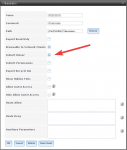pcubed
Cadet
- Joined
- May 10, 2021
- Messages
- 7
Hi folks,
I'm upgrading a system (which I just took over) from FreeNAS 9.2.0 to TrueNAS Core 12. There was a behavior setup in the old version of FreeNAS for our Windows Shares (used with Active Directory services) that every file in the share had the same owner by default (in this case, the domain admin) regardless of who created the file. I'm not sure if it came from the old option "Inherit Owner", which I can no longer see in the options in TrueNAS, or not (see attached image). Is there a way to replicate this behavior in TrueNAS?
Thank you for your help in advance!
I'm upgrading a system (which I just took over) from FreeNAS 9.2.0 to TrueNAS Core 12. There was a behavior setup in the old version of FreeNAS for our Windows Shares (used with Active Directory services) that every file in the share had the same owner by default (in this case, the domain admin) regardless of who created the file. I'm not sure if it came from the old option "Inherit Owner", which I can no longer see in the options in TrueNAS, or not (see attached image). Is there a way to replicate this behavior in TrueNAS?
Thank you for your help in advance!

